Digital Water refers to the integration of emergent digital technologies such as data analytics, IoT, Artificial Intelligence, and automation into water management systems. This transformation is reshaping how the water industry operates, enhancing efficiency, improving resource management, and enabling real-time decision-making. As utilities and organizations adopt digital water solutions, the demand for skilled professionals in this evolving field is growing. The WATERLINE project addresses this need. The project, which receives funding from the European Union’s Horizon Europe, aims to create a European Digital Water Higher Education Institution Alliance to leverage the individual, institutional and regional resources required for a transformative structural change to be prepared for this new reality.
The Malta College of Arts, Science, and Technology (MCAST) successfully held the 2nd WATERLINE Project Maltese Community of Practice (CoP) meeting on campus in Paola. Local stakeholders attended the event, in which the College is the project lead partner.
MCAST Principal and CEO Mr Stephen Vella, Deputy Principal at MCAST’s Applied Research and Innovation Centre (ARIC) Dr Tajana Chircop, and Water Services Corporation (WSC) CEO Mr Karl Cilia delivered opening speeches.
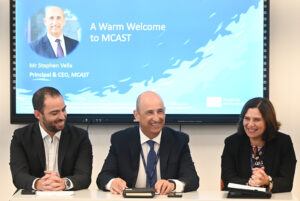
The WATERLINE project marks the first time that the College led and coordinated a consortium on a HORIZON EUROPE project. The WATERLINE project aims to form a European Digital Water Alliance, bringing together public authorities, industry, academia and citizens to promote innovation and entrepreneurship in the water sector.
The project supports the growth of the Digital Water Alliance by strengthening academic research, developing a master’s curriculum in digital water, and creating innovative learning environments through EdTech. It also aims to build a European network of researchers focused on water technology.
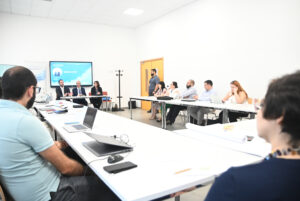
The WATERLINE project has just commenced its third and final year. Throughout the past years, numerous achievements have been achieved. Waterline has:
- Established a strategic R&I Capacity Building Plan;
- Produced a report highlighting the challenges and opportunities in digital water education and partnerships;
- Mapped Digital Water Innovation Ecosystems;
- Developed a Masters programme in Digital Water;
- Created a common workspace for Technology Innovations;
- Researched extensively available R&I Funding opportunities;
- Led various Dissemination & Communication Activities;
- Dissminated research findings through the release of 3 academic papers;
- Coordinated clustering activities with other projects;
- Developed four digital learning environments using Extended Reality.
During the WATERLINE CoP meeting representatives from industry, academia, civil society and policymakers conferred the importance of having a unified approach to Digital Water implementation. Furthermore, during the meeting discussions were made on identifying the professional networks and fostering collaboration to create a strong sense of community within the Digital Water Alliance. Participants had the opportunity to share various insights about the impact WATERLINE in the area of water education.
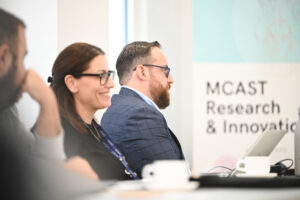
Edwin Zammit, principal investigator in the WATERLINE project, outlined some of the key take-home messages from the event, emphasizing the growing importance of digital transformation in water management. He highlighted the need for ongoing collaboration between academia, industry, and policymakers to ensure the development of scalable, sustainable solutions. Zammit also stressed the critical role of upskilling the current workforce, as well as preparing future professionals with the digital competencies required to navigate and innovate within the rapidly evolving water sector.
Another key pilliar of WATERLINE is the capacity building activities it organises to enhance the skills of early career researchers and MCAST staff. These initiatives include, summer schools, research opportunities on innovation technology and water education, seminars on project scientific landmarks, training on Life Cycle Assessment, training on personal and professional development skills, training on Digital Learning Environments for facutly members and, hackathon events on entrepreneurship in digital water.
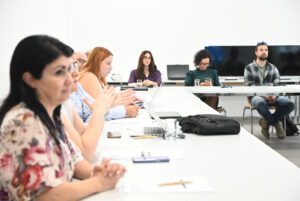
The project also aims to give current and future professionals the skills they need to work in the increasingly tech-driven water industry. This is done by exposing today’s students to learning environments that utilize novel learning technologies. During the project, a three-tier learning approach was developed which includes a physical emulation environment (Tier 1 – ELE), an augmented learning environment (Tier 2 – ARLE) and virtual learning environment (Tier 3 – ViRLE). During the meeting, the Virtual Reality water network distribution test rig learning environment, developed by a research team at MCAST under the leadership of Mr. Daren Scerri, was presented. CoP members were given the exclusive opportunity to test out and explore the VR app firsthand.
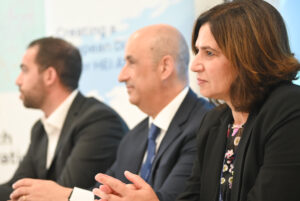
The WATERLINE project receives funding from the European Union’s Horizon Europe HORIZON-WIDERA-2021-ACCESS-05 under grant agreement No 101071306.







 MCAST Main Campus
MCAST Main Campus  +356 2398 7100
+356 2398 7100
 information@mcast.edu.mt
information@mcast.edu.mt